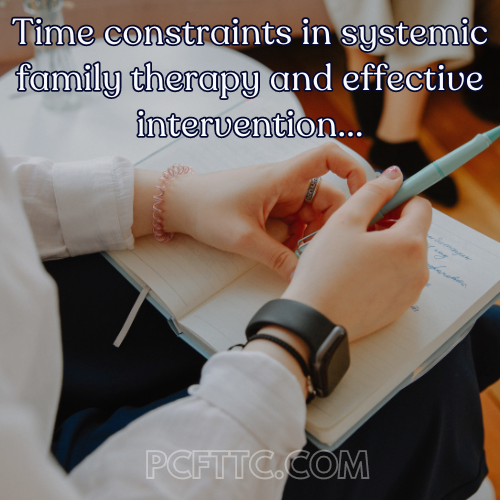
Time constraints in therapy sessions can be a significant challenge for systemic family therapists, as the complexity of family dynamics often requires more time than is typically available. Given these constraints, therapists must employ effective and efficient interventions to make the most of each session. One powerful technique that can help address this challenge is the use of enactments to promote change in interactional patterns within the family.
Time Constraints in Sessions
Therapy sessions are typically limited to 50-60 minutes, a relatively short period to address the intricate and deep-seated issues within a family system. Therapists may feel pressured to prioritize immediate concerns, leaving little time to explore underlying patterns that contribute to ongoing problems. Additionally, when multiple family members are involved, each with their own perspectives and needs, it can be challenging to ensure that everyone’s voice is heard within the time constraints. This can result in surface-level discussions that do not address the root causes of dysfunction, limiting the effectiveness of the therapy.
Enactments as an Effective Intervention
Enactments offer a focused and efficient method for addressing these challenges by directly engaging family members in the therapeutic process. Instead of merely discussing issues abstractly, enactments involve having family members role-play specific interactions or conflicts that typically occur in their daily lives. This approach allows therapists to observe and address problematic interactional patterns in real-time, making the intervention more immediate and impactful.
Promoting Change in Interactional Patterns
Through enactments, therapists can guide family members to experiment with new ways of interacting. For example, if a family struggles with communication breakdowns during conflicts, the therapist might ask them to reenact a recent argument. During the enactment, the therapist can intervene to encourage the use of active listening, “I” statements, and other positive communication strategies. This hands-on practice helps family members experience and internalize new interactional patterns more effectively than through verbal instruction alone.
Maximizing Session Effectiveness
By utilizing enactments, therapists can maximize the effectiveness of their sessions despite time constraints. Enactments allow for immediate feedback and correction, making it possible to address deep-rooted issues in a short period. The experiential nature of enactments also ensures that the changes practiced in session are more likely to be remembered and applied in real-life situations, leading to lasting improvements in family dynamics.
Conclusion
In the face of time constraints, enactments provide a powerful tool for systemic family therapists to promote meaningful change in interactional patterns. By focusing on real-time practice and immediate feedback, enactments can enhance the effectiveness of therapy sessions, helping families break free from negative patterns and develop healthier ways of relating to one another.




